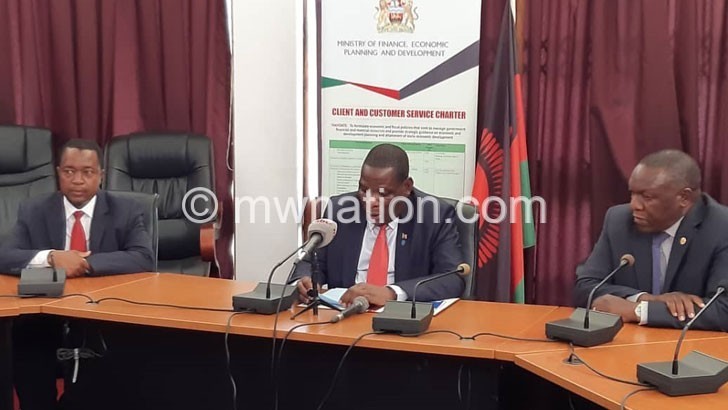IMF nods to post Idai reconstruction
Malawi on Friday passed the International Monetary Fund (IMF) test as the fund’s Executive Board of Directors, sitting in Washington D.C, approved resources amounting to $40 million (about K29 billion) to support Malawi’s reconstruction efforts in the aftermath of the devastating cyclone Idai.
The approval of the funds follows Friday’s meeting by the IMF Board, which approved what is known as ‘Augmentation of Access’ for Malawi to finance imports for post cyclone reconstruction.
The Board also met to complete the second and third reviews of the three-year Extended Credit Facility (ECF) programme with Malawi, an arrangement which is worth $112.3 million (about K83.1 billion).

during the press briefing yesterday
Breaking the news to journalists at Capital Hill yesterday, Minister of Finance, Economic Planning and Development Joseph Mwanamvekha was all smiles throughout the interface, describing the decision by IMF as a clear signal by the fund “of their faith in Malawi government’s economic management”.
“As a nation, this approval by IMF has come at a time when government and the people of Malawi are focused on a growth path to take advantage of the macroeconomic stability that continue to prevail in this country,” said the Minister, flanked by Reserve Bank of Malawi (RBM) Governor Dalitso Kabambe and Secretary to the Treasury Cliff Chiunda.
According to Mwanamvekha, the resources will be disbursed to Malawi by the first week of December 2019.
He said following the IMF approval, Capital Hill and Malawians expect “without doubt” that such a decision will have a strong signaling effect to other donors to resume budget support to Malawi.
In the wake of revelations of the plunder of public resources at Capital Hill, known as Cashgate, exposed in October 2013, donors suspended direct budget support to Malawi.
Instead, the donors channelled their assistance through some international non-governmental organisations.
Before suspension of direct budget support, donors were putting up to 30 percent in Malawi’s recurrent budget and at least 85 percent of the development budget.
Mwanamvekha said government will continue with fiscal policy consolidation to ensure that public debt is clearly brought on a downward trajectory.
He added: “Already, government has commenced recording positive outcomes from its domestic revenue mobilisation efforts. Let me assure the people of Malawi that this government will also continue to reorient spending towards growth enhancing and resilient infrastructure, while safeguarding social spending to ensure that resilience against different economic shocks which mostly affect vulnerable citizens.”
On his part, Kabambe described the IMF approval of the resources to Malwi as “exciting news”, also hoping that the development will play a catalytic role in compelling other development partners to support Malawi.
“This is a collective effort. It is not a one-man’s job to achieve this. It’s quite exciting news and for sure macro-economic stability will be well anchored,” he said.
According to the IMF statement, issued yesterday by Dumisani Mahlinza, IMF executive director for Africa Group One Constituency, during the Board discussion, the executive director positively noted that the Malawi economy continued to strengthen despite cyclone Idai and the recent political unrest.
Accordingly, Mahlinza said directors encouraged the Malawi authorities to sustain fiscal consolidation and ensure that public debt is clearly brought on a downward trajectory.
“In addition, directors welcomed the authorities’ commitment to focus monetary policy on anchoring inflation and maintaining exchange rate flexibility, which would help cushion against external shocks and enhance competitiveness,” he added.





